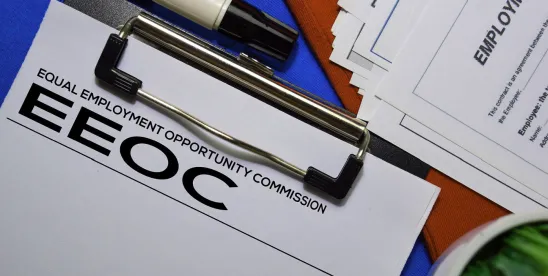On 28 January 2025, the Acting Chair of the Equal Employment Opportunity Commission (EEOC or Commission), Andrea Lucas (Acting Chair Lucas) issued a statement announcing that the Commission is returning to its “mission of protecting women from sexual harassment and sex-based discrimination in the workplace by rolling back the Biden administration’s gender identity agenda.”
This statement followed President Trump’s issuance of Executive Order 14168 (EO 14168), which, among other things, directs federal agencies to enforce “the freedom to express the binary nature of sex and the right to single-sex spaces in the workplace” and remove all existing statements, policies, forms, communications, or messages promoting gender ideology. EO 14168 states that the federal government shall recognize only two sexes—male and female.
Acting Chair Lucas has already taken several actions to enforce the terms of EO 14168.
First, one day after President Trump issued EO 14168, she announced several priorities for the EEOC’s compliance, investigations, and litigation—one being to “defend the biological and binary reality of sex and related rights, including women’s rights to single sex spaces at work.”1
Acting Chair Lucas has also removed materials promoting gender ideology from the EEOC’s internal and external websites and documents. This review remains ongoing. She also began a content review of the EEOC’s “Know Your Rights” poster, which all covered employers are required to post in their workplaces, removed the display of EEOC employees’ pronouns in internal and external communications, and removed the “X” and “Mx.” gender markers from the Commission’s charge and related forms and intake process.
Acting Chair Lucas has indicated that she cannot unilaterally remove or modify certain gender identity-related documents, as doing so requires a majority vote of the full Commission. And notably, after President Trump’s unprecedented termination of two sitting Democratic EEOC commissioners on 27 January 2025, the EEOC lacks a voting quorum with only two of its five members in place—Acting Chair Lucas and Democratic Commissioner Kalpana Kotagal.
These documents include the Commission’s “Enforcement Guidance on Harassment in the Workplace” (issued by a 3-2 vote in 2024) (Harassment Guidance), which EO 14168 specifically requested be rescinded, as well as the EEOC Strategic Plan 2022-2026 (issued by a 3-2 vote in 2023), and the EEOC Strategic Enforcement Plan Fiscal Years 2024-2028 (issued by a 3-2 vote in 2023). Acting Chair Lucas voted against each of these documents. She has been particularly vocal about her opposition to portions of the Harassment Guidance that state that harassing conduct under Title VII includes “denial or access to a bathroom or other sex-segregated facility consistent with [an] individual’s gender identity” and “repeated and intentional use of a name or pronoun inconsistent with [an] individual’s known gender identity.”
Looking Ahead
While Acting Chair Lucas has made clear the Commission’s priority to enforce the “binary reality of sex,” including by removing guidance and references to “gender identity,” this new priority may be in tension with current federal law. Indeed, in Bostock v. Clayton County,2 the US Supreme Court held that Title VII prohibits discrimination and harassment based on gender identity and sexual orientation. It is certainly possible that the Supreme Court could revisit this ruling and reach a different conclusion—as its makeup has changed since the Bostock decision. However, unless and until the court does so or Congress amends Title VII, employment discrimination against transgender and gender nonconforming individuals remains illegal under federal law.
Additionally, more than half of the states in the United States have laws explicitly prohibiting, or have interpreted other laws to prohibit, discrimination and harassment based on sexual orientation and gender identity. These laws remain in effect.
We are likely to see an increase in workplace disputes on this issue in the future—including disputes involving “single sex spaces” in the workplace, such as bathrooms and locker rooms—which the court specifically avoided discussing in Bostock, but are addressed at the state and local level. For example, guidance from the California Civil Rights Department provides that “[a]ll employees have a right to safe and appropriate restroom and locker room facilities . . . [which] includes the right to use a restroom or locker room that corresponds to the employee’s gender identity, regardless of the employee’s sex assigned at birth.”3 Additionally, according to published guidance, the New York City Human Rights Law requires that employers permit employees “to use single-gender facilities, such as restrooms or locker rooms, and to participate in single-gender programs, that most closely align with their gender, regardless of their gender expression, sex assigned at birth, anatomy, medical history, or the sex or gender indicated on their identification.”4
Employers may also see an increase in challenges to gender-identity-related policies and practices—including policies that permit or require employees to designate or use pronouns in communications to comply with state or local law,5 as well as an increase in religious accommodation requests related to such policies.6 Given the current conflicting legal landscape, employers should consider a review of any such policies with counsel to ensure compliance with applicable law. Moreover, with the change in federal guidance, states and municipalities may adopt additional regulations addressing gender identity protections in the workplace. Despite the shift in enforcement priorities, employers should continue to implement anti-discrimination, anti-harassment, and equal opportunity policies as well as conduct workplace trainings consistent with applicable law; and monitor developments at the state and federal level. Employers should also continue to emphasize workplace respect, civility, and anti-bullying expectations generally for their workforce.
There are likely to be many more developments in the coming days and weeks.
Footnotes
1 See, EEOC Press Release, President Appoints Andrea R. Lucas EEOC Acting Chair, January 21, 2025, https://www.eeoc.gov/newsroom/president-appoints-andrea-r-lucas-eeoc-acting-chair.
2 590 U.S. 644 (2020).
3 See California Civil Rights Department, Fact Sheet on The Rights of Employees Who Are Transgender or Gender Nonconforming, November 2022, https://calcivilrights.ca.gov/wp-content/uploads/sites/32/2022/11/The-Rights-of-Employees-who-are-Transgender-or-Gender-Nonconforming-Fact-Sheet_ENG.pdf.
4 See NYC Commission on Human Rights Legal Enforcement Guidance on Discrimination on the Basis of Gender Identity or Expression: Local Law No. 3 (2002); N.Y.C. Admin. Code § 8-102, (last updated February 15, 2019), https://www.nyc.gov/assets/cchr/downloads/pdf/publications/2019.2.15%20Gender%20Guidance-February%202019%20FINAL.pdf.
5 According to published guidance, the New York City Human Rights Law “requires employers and covered entities to use the name, pronouns, and title (e.g., Ms./Mrs./Mx.) with which a person self-identifies, regardless of the person’s sex assigned at birth, anatomy, gender, medical history, appearance, or the sex indicated on the person’s identification.” See id.
6 It is important to note that following the US Supreme Court decision in Groff v. DeJoy, 600 U.S. 447 (2023), there is a heightened threshold for determining undue hardship for religious accommodation requests. See K&L Gates Legal Alert, US Supreme Court Unanimously Adopts Heightened “Undue Hardship” Standard in Title VII Religious Accommodation Analysis, June 30,2023, https://www.klgates.com/US-Supreme-Court-Unanimously-Adopts-Heightened-Undue-Hardship-Standard-in-Title-Vii-Religious-Accommodation-Analysis-6-30-2023.






 />i
/>i
